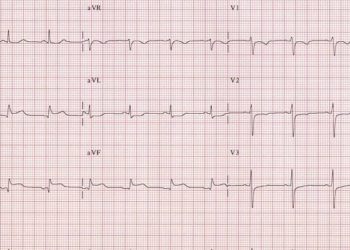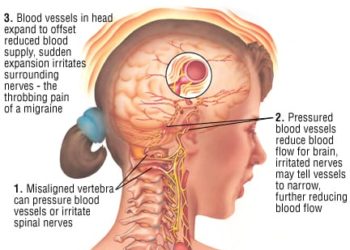Every-other-day dosing of oral rimegepant is effective for preventive treatment of migraines
1. Rimegepant significantly reduced the mean number of migraine days per month between the last 4 weeks of treatment and the observation period compared to placebo (-4.3 days vs. -3.5 days).
2. Patients in both groups were equally likely to have an adverse event and most events were mild-moderate in severity.
Evidence Rating Level: 1 (Excellent)
Study Rundown: Migraines are the leading cause of disability in individuals younger than 50 years of age. In particular, women of childbearing age are a population especially burdened by the occurrence of migraines. Rimegepant is an oral calcitonin gene-related peptide (CGRP) receptor antagonist that is approved in the USA for acute treatment of migraine in adults but whether it can be used for preventative treatment is unclear. This multicenter, double-blind, randomized controlled trial aimed to compare the safety, efficacy, and tolerability of rimegepant, taken every other day, with placebo for preventive treatment of migraines. Primary outcome for this study was the change, from baseline, in the mean number of migraine days per month in the last 4 weeks of treatment (weeks 9-12). Secondary outcomes included ≥ 50% reduction in the mean number of moderate or severe migraine days per month and mean number of rescue medication days per month (weeks 9-12). Secondary safety endpoints included the frequency of adverse events and clinically significant laboratory abnormalities. According to study results, rimegepant was superior to placebo on the primary endpoint of change. Additionally, rimegepant was found to be safe and tolerable as patients in both groups were equally likely to report an adverse event. This study was limited by a lack of representation among individuals of non-white ethnicities which may hinder the generalizability of the results. Overall, this study suggests that oral rimegepant given every other day may be useful for preventive treatment of migraine.
Click to read the study in The Lancet
Relevant Reading: Rimegepant, an Oral Calcitonin Gene–Related Peptide Receptor Antagonist, for Migraine
In-depth [randomized controlled trial]: Between Nov 14, 2018, and Aug 30, 2019, 1591 patients were assessed for eligibility at 92 sites in the USA. Included patients were those ≥ 18 years old with a previous history of migraine, initial presentation of migraine before the age of 50, between 4-18 migraine attacks per month during the 3 months prior to screening visit, and ≥ 6 migraines during the 4-week observation period. Patients with > 18 migraine days during observation, alcohol or drug abuse within the past 12 months, and known drug allergies were excluded. Altogether, 741 patients were included in the safety analysis (370 rimegepant, 371 placebo) and 695 were included in the efficacy analysis (348 rimegepant, 347 placebo). Mean time on double-blind treatment was similar for patients in both groups.
Among treated patients (n=741), the mean age was 41.2 years (standard deviation [SD] 13.1). The majority of patients were women (n=613, 83%) and of white race (n=604, 82%). Rimegepant (-4.3 days, 95% confidence interval [CI] -4.8 to -3.9) was superior to placebo (-3.5 days, 95% CI -4.0 to -3.0) with regard to the primary outcome of change in the number of migraine days per month during weeks 9-12 compared to the 4-week observation period (least squares mean difference -0.8 days, 95% CI -1.46 to -0.20, p=0.0099). Rimegepant was significantly more effective than placebo for the percentage of patients with ≥ 50% reduction in the number of moderate or severe migraine days per month in the last month of treatment (49%, 95% CI 44-54 vs. 41%, 95% CI 36-47, p=0.044). Both groups were similar with respect to the mean days of rescue medication per month in the last month of treatment (3.7, 95% CI 3.3 to 4.2 for rimegepant vs. 4.0, 95% CI 3.5 to 4.4 for placebo, p=0.39) and number of adverse events (n=133, 36% for both groups). Findings from this study suggest that rimegepant may be effective for preventive treatment of migraine, with a similar tolerability to that of placebo and no unexpected or serious safety issues.
Image: PD
©2021 2 Minute Medicine, Inc. All rights reserved. No works may be reproduced without expressed written consent from 2 Minute Medicine, Inc. Inquire about licensing here. No article should be construed as medical advice and is not intended as such by the authors or by 2 Minute Medicine, Inc.









